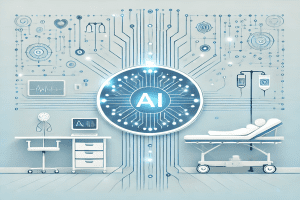Contents
Clinical Information Systems (CIS) are the backbone of modern healthcare, designed to manage patient records, streamline workflows, and facilitate communication among healthcare teams. However, the complexity of healthcare data often limits the actionable insights these systems provide. Enter Artificial Intelligence (AI) – a transformative technology that bridges the gap between raw data and decision-making. This article explores how AI is enhancing CIS to empower healthcare providers and improve patient outcomes.
The Role of AI in CIS
From Data Overload to Actionable Insights
Healthcare generates massive volumes of data daily, from electronic health records (EHRs) to imaging and laboratory results. AI algorithms excel at processing this data, identifying patterns, and extracting meaningful insights. For example, machine learning models can analyze patient histories to predict potential complications, allowing providers to intervene earlier.
Predictive Analytics for Proactive Care
AI’s predictive analytics capabilities are revolutionizing healthcare. Clinical Information Systems integrated with AI can forecast patient risks, such as the likelihood of readmission or disease progression. This empowers healthcare teams to take proactive measures, enhancing patient care and reducing costs.
Enhancing Decision Support
Traditional CIS provide basic decision support, such as drug interaction alerts. With AI, these systems become significantly more advanced. AI-powered CIS can offer personalized treatment recommendations based on a patient’s medical history, genetics, and current condition. This level of precision supports clinicians in making informed decisions faster.
Benefits of AI-Enhanced CIS
Improved Efficiency
AI automates routine tasks, such as scheduling, billing, and documentation, freeing up time for healthcare professionals to focus on patient care. Additionally, by streamlining workflows, AI reduces delays and improves the overall efficiency of healthcare delivery.
Better Patient Outcomes
AI-powered insights enable providers to offer more accurate diagnoses and personalized treatments. For instance, AI can assist in identifying rare conditions by analyzing patterns in a patient’s symptoms and test results, leading to earlier and more effective interventions.
Enhanced Collaboration
AI facilitates better communication among healthcare teams by synthesizing data from various sources and presenting it in an accessible format. This unified approach ensures all team members have the information they need to make cohesive decisions.
Overcoming Challenges
Data Privacy and Security
The integration of AI in CIS raises concerns about data privacy and security. Healthcare organizations must prioritize compliance with regulations like HIPAA and implement robust measures to protect sensitive information.
Integration with Existing Systems
Many healthcare providers rely on legacy systems that are not easily compatible with AI technologies. Transitioning to AI-enhanced CIS requires careful planning and investment to ensure seamless integration.
Building Trust in AI
Clinicians may be hesitant to rely on AI for critical decisions. Providing transparent AI models and demonstrating their accuracy can help build trust and encourage adoption.
Future Outlook
Real-Time Decision-Making
The next generation of AI-powered CIS will enable real-time decision-making. For example, AI can monitor patient vitals continuously and alert providers to critical changes instantly, improving outcomes in emergency situations.
Advanced Predictive Capabilities
As AI continues to evolve, predictive analytics will become even more sophisticated. Future systems may anticipate disease outbreaks, optimize hospital resources, and provide tailored public health recommendations.
Integration with Wearable Devices
Wearable health devices generate valuable data that can enhance CIS. Integrating AI with these devices will provide healthcare providers with continuous insights, enabling more personalized and proactive care.
Conclusion
Artificial Intelligence is transforming Clinical Information Systems into powerful tools for data-driven decision-making. By bridging the gap between complex data and actionable insights, AI empowers healthcare providers to deliver better care, improve efficiency, and enhance collaboration. As this technology advances, the potential for AI-enhanced CIS to revolutionize healthcare is limitless.
Scimus is at the forefront of developing AI-driven healthcare solutions. Partner with us to explore how we can elevate your Clinical Information Systems to meet the demands of tomorrow’s healthcare challenges.



